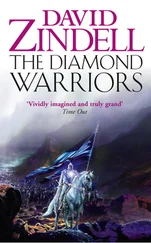David Gibbins - The Tiger warrior
Здесь есть возможность читать онлайн «David Gibbins - The Tiger warrior» весь текст электронной книги совершенно бесплатно (целиком полную версию без сокращений). В некоторых случаях можно слушать аудио, скачать через торрент в формате fb2 и присутствует краткое содержание. Жанр: Прочие приключения, на английском языке. Описание произведения, (предисловие) а так же отзывы посетителей доступны на портале библиотеки ЛибКат.
- Название:The Tiger warrior
- Автор:
- Жанр:
- Год:неизвестен
- ISBN:нет данных
- Рейтинг книги:4 / 5. Голосов: 1
-
Избранное:Добавить в избранное
- Отзывы:
-
Ваша оценка:
- 80
- 1
- 2
- 3
- 4
- 5
The Tiger warrior: краткое содержание, описание и аннотация
Предлагаем к чтению аннотацию, описание, краткое содержание или предисловие (зависит от того, что написал сам автор книги «The Tiger warrior»). Если вы не нашли необходимую информацию о книге — напишите в комментариях, мы постараемся отыскать её.
The Tiger warrior — читать онлайн бесплатно полную книгу (весь текст) целиком
Ниже представлен текст книги, разбитый по страницам. Система сохранения места последней прочитанной страницы, позволяет с удобством читать онлайн бесплатно книгу «The Tiger warrior», без необходимости каждый раз заново искать на чём Вы остановились. Поставьте закладку, и сможете в любой момент перейти на страницу, на которой закончили чтение.
Интервал:
Закладка:
“Eloquently put, as always.” Hiebermeyer pushed his little round glasses up his nose. “Unusually for an Erythraean Sea merchant, he didn’t retire to Alexandria or Rome, but seems to have stayed in the Egyptian port that had probably been his base all his working life. Perhaps he was given some sort of administrative role, maybe as duovir , prefect of the town, to supervise it during the off-season when it was largely deserted. But few wealthy men able to afford a villa actually wanted to live in Berenike, and his house was impractical, especially with the high-value trade winding down.”
“Maybe he didn’t die there.” Rebecca looked at Aysha, who nodded encouragingly. “Aysha thinks he had a wife, and she was Indian. One sherd had a female Indian name, Amrita. She showed me pictures of some of the stuff they found, other sherds with Tamil graffiti, fragments of Indian textile, pottery from southern India. Maybe the Periplus was his last say as a trader, and after finishing it he took his family and left on a final voyage to the east, never to return.”
Costas rubbed his chin. “Nice thinking. Maybe after all that time trading in India, he went native.”
Jack was absorbed in a cluster of small potsherds placed close together, clearly the remains of two large sherds which had been smashed. “Look at this,” he exclaimed. “Amazing. I can read the words Ptolemais Theron, Ptolemy of the Hunts. That’s the elephant port on the Red Sea, Costas. And over here, Rebecca, on this other sherd, I can see Taprobane. That’s what Sri Lanka was called, five hundred years before Cosmas Indicopleustes sailed here.” He straightened up and looked at Hiebermeyer. “Well? This is all fantastic. But I know you too well. What did you really want me to see?”
“Spill it, Hiemy,” Costas said.
Hiebermeyer’s eyes bored into Costas. He turned to Jack. “We’ve got a little under a third of the Periplus here, about a thousand words. It’s very similar to the tenth century copy, with only minor differences in wording and grammar. With one exception.”
“Go on,” Jack said.
Hiebermeyer pointed at a large sherd beside Rebecca, and they all crowded around. The sherd was about the size of a dinner plate, and was covered with fifteen lines of fine writing, the ink barely discernible in places against the whitish surface patina on the pottery. The text had been written within the sherd, and was not broken off at the edges. “It’s an intact section, like a paragraph,” Hiebermeyer said. “It’s where he describes sailing beyond the Arabian Gulf and looks toward India, just before reaching the port of Barygaza at the mouth of the Indus.”
“You mean the section where he puts on his archaeologist hat,” Jack murmured.
Hiebermeyer nodded. “Generally he only digressed where it was of practical value, for example showing where a certain local tribe was to be avoided, or describing an inland region to give an idea of where the trade goods came from. There are two fascinating exceptions, both concerning Alexander the Great. In one place he describes how Alexander penetrated as far as the Ganges but not to the south of India. He says how in the market in Barygaza, near the mouth of the Indus, you can find coins, old drachmas, engraved with inscriptions of rulers who came after Alexander.”
“Apollodotus and Menander, the first Seleucid kings,” Jack said.
Hiebermeyer nodded. “Western traders going to India would have been well-versed in the story of Alexander, and doubtless there were locals who saw a quick buck in passing off Seleucid coins as relics. Alexander lived in the fourth century BC, three hundred years before the Periplus was written, but the story was still so big that people coming out here might have felt the dust of conquest had barely settled. Our merchant knew all about sharp dealing and was warning his readers that the relics were bogus. He wasn’t the kind of man who was duped by these stories. That makes me think we should take his second reference seriously, what you see on this sherd.”
“I’ve spotted the word Alexandros,” Costas said, peering down at the sherd. “My ancient Greek’s a little rusty.”
“Here’s the translation.” Hiebermeyer picked up a piece of paper covered with his indecipherable handwriting. “Immediately following Barake is the gulf of Barygaza and the shore of the land of Ariake, the beginning of the kingdom of Manbanos and of all India. The inland part, which borders Skythia, is called Aberia; the coastal part is Syrastrene. The region is very fecund, producing grain, rice, sesame oil, ghee, cotton, and the Indian cloths made from it, those of ordinary quality. There are numerous herds of cattle, and the men are very large and have dark skin. To this day there are still preserved around this area traces of Alexander’s expedition: archaic altars, the foundations of encampments and huge wells”
Jack nodded. “Archaic altars. That sounds like the familiar text.”
“But not the next sentence.” Hiebermeyer paused, and pushed up his glasses. And from Margiana, the citadel of Parthia to the north of here, the Roman legionaries captured at Carrhae escaped east, taking the Parthian treasure with them toward Chryse, the land of gold.”
Jack reeled as if he had been physically struck. “That’s incredible,” he said, almost whispering. “That’s not in the Periplus.”
“Isn’t that what you were telling me about in the helicopter, Jack?” Costas said. “Crassus, his lost legions?”
“Hearsay and rumor,” Jack murmured. “Until now.” He took a deep breath, and looked at Rebecca. “After the Roman defeat at Carrhae in 53 BC, the Parthians took thousands of legionaries prisoner, possibly as many as ten thousand. Their fate fascinated the Romans for generations. The poet Horace wrote of it in one of his odes, wondering if Roman veterans had taken native wives and fought as mercenaries for a foreign ruler. Then Augustus’ son Tiberius negotiated peace with the Parthians and the captured legionary standards were returned, a great triumph for Augustus that closed the chapter on the defeat.”
“Jack showed you the coin from our shipwreck, didn’t he, Rebecca?” Costas said. “That celebrates the return of the eagles, the sacred legionary standards.”
Jack nodded, his mind racing. “The only other hint from Roman sources is in the Natural History of Pliny the Elder, who says the captured legionaries were taken to Margiana, the Parthian capital in present-day Turkmenistan.”
“That’s what gives the Periplus plausibility,” Hiebermeyer said. “And look at the Alexander reference. He only tells us what he can verify. Alexander is known to have set up altars during his conquest. They could have been where Alexander took his army across the Turkmenistan desert toward central Asia.”
“Of course,” Jack replied. “Alexander went past Margiana, modern Merv. And if prisoners were escaping east from Merv, they could have passed these altars on the way east toward central Asia. It all fits.”
“Why would the author later delete this reference?” Costas asked.
“It must have been something he felt was true, but could never substantiate,” Aysha said. “Ancient coins you can hold, altars you can see, but stories are just that. We imagine he was told the story by a trader, perhaps a Bactrian or Sogdian middleman who brought him silk. But perhaps that trader had broken off contact, had disappeared without a trace as so often happened on the Silk Route. Perhaps as an old man the author may even have doubted his memory. The story of treasure on the Silk Route may have sounded like an adventurer’s fable. There was enough doubt in the end for him to strike a line through that sentence on the sherd and ditch it into the refuse pile. It was an anecdote best passed on by word of mouth, that might one day reach the ear of an encyclopedist like Pliny the Elder, and find its way into a cornucopia of fact and hearsay like the Natural History”
Читать дальшеИнтервал:
Закладка:
Похожие книги на «The Tiger warrior»
Представляем Вашему вниманию похожие книги на «The Tiger warrior» списком для выбора. Мы отобрали схожую по названию и смыслу литературу в надежде предоставить читателям больше вариантов отыскать новые, интересные, ещё непрочитанные произведения.
Обсуждение, отзывы о книге «The Tiger warrior» и просто собственные мнения читателей. Оставьте ваши комментарии, напишите, что Вы думаете о произведении, его смысле или главных героях. Укажите что конкретно понравилось, а что нет, и почему Вы так считаете.












